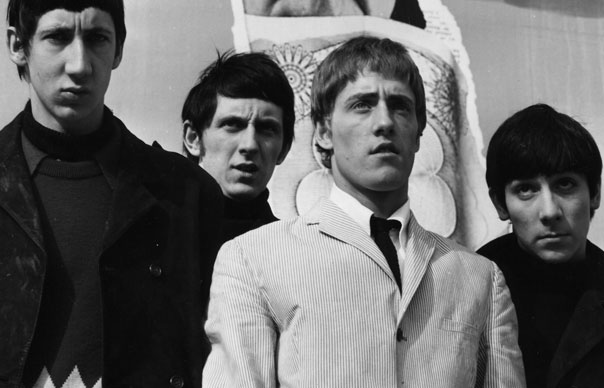Won’t Get Fooled Again (Townshend)
Producer: The Who
B-side: I Don’t Even Know Myself (Townshend)
Released: July 1971
Highest UK chart position: 9
It would be a good year after “The Seeker” before The Who finally managed to escape from Tommy’s shadow with 1971’s Who’s Next, still regarded by the majority of fans and critics as their most accomplished album (a new deluxe two-CD edition is currently scheduled for release in 2003).
It proved to be an especially problematic transition for Townshend, who had been hatching plans for his Lifehouse project in the interim. Lifehouse was another extravagant rock opera heavily influenced by Meher Baba, one so complex in plot and staging requirements (an interactive cinematic performance fused with what promised to be an improvised concert lasting not hours but days) that it made Tommy seem like a nursery rhyme.
His failure to convince his colleagues that Lifehouse was feasible dealt Townshend’s ego a hammer blow, even if the best of its proposed songs would form the basis of The Who’s new repertoire for the next two years.
While originally the power ballad “Behind Blue Eyes” had been earmarked as The Who’s Next tie-in single, concerns over its supposed ‘un-Who like’ nature resulted in the album’s awesome eight-and-a-half minute finale, “Won’t Get Fooled Again”, being halved in length and substituted in its place. Best appreciated in its unabridged album incarnation, the song was a sublime A-side all the same, joining the sacred elite of “My Generation” and “Pinball Wizard” as evidence of The Who at their most anthemic.
Even by today’s standards, the contrast between Townshend’s ferocious windmill guitar riff and his pioneering synthesizer backwash (which, as Daltrey points out, is actually an organ put through a sequencer) is electrifying. Daltrey’s vocal, too, was his most savage since “My Generation”, and the perfect vehicle for the song’s cynical thesis on the nature of revolution.
Strangely, it was this, rather than the contentious shortening of the album master, which was to cause Townshend regret in the single’s aftermath. Berating its apoliticism as “irresponsible”, the author of “Won’t Get Fooled Again” went as far as to nominate it “the dumbest song I’ve ever written”.
Daltrey: “That big scream I did on ‘Won’t Get Fooled Again’ was totally instinctive, but it became kind of the focal point of the song. It pisses me off because I don’t get any royalties for it! But I hated it when they chopped it down. I used to say ‘Fuck it, put it out as eight minutes’, but there’d always be some excuse about not fitting it on or some technical thing at the pressing plant. After that we started to lose interest in singles because they’d cut them to bits. We thought, ‘What’s the point? Our music’s evolved past the three-minute barrier and if they can’t accommodate that we’re just gonna have to live on albums.’”
________________________
Let’s See Action (Townshend)
Producer: The Who
B-side: When I Was A Boy (Entwistle)
Released: October 1971
Highest UK chart position: 16
In spite of the rave reviews Who’s Next garnered, Townshend casually considered it “quite unadventurous”, while his bitter brooding over the fate of Lifehouse ensured that, by their next epic, 1973’s Quadrophenia, they became a band divided.
It was symptomatic of the disharmony that Entwistle, Townshend and Daltrey would all embark on solo careers. As Moon, who followed suit with 1975’s Two Sides Of The Moon, commented: “To get the four of us talking around a table is a major achievement.”
With exhaustive touring commitments to fulfil, it was ironic that, at a time when The Who were busy establishing themselves as the greatest albums band of their day, they were forced to stay afloat by issuing a trilogy of non-album singles. All three were Lifehouse cast-offs sharing the theme of unity-through-music central to the plot of Townshend’s lost magnum-opus. The first, “Let’s See Action” (a Who’s Next outtake), was a driving honky-tonk shuffle in which the personality clash between Daltrey and Townshend would be metaphorically illustrated by their shared vocal duties; the former’s motivational call-to-arms in harsh contrast with the latter’s folky, philosophical middle-eight and Krishna-style chant.
Daltrey: “Pete was going through a terrible bitterness about the fact that Kit Lambert and Chris Stamp hadn’t got behind making Lifehouse as a film. But the reason they didn’t get behind it was because they couldn’t get to grips with the narrative, and I still feel to this day – even though Pete’s done his Lifehouse Chronicles box and done it as a radio play – well, I’m sorry but though there’s some incredible music in there and some sparks of theoretical and theological ideas, I think the narrative thread of the story is about as exciting as a fucking whelk race! But I always liked ‘Let’s See Action’. It’s got that texture of explosive rock’n’roll bits mixed in with a laid-back, almost country feel. I still love the sentiment behind it, too.”


